Five approaches to wellbeing we have been particularly impressed by this year. From getting active outdoors, to writing poetry, or making art, initiatives aim to manage specific pressures the organisations identified.
Features
Five top wellbeing initiatives of 2022
1. IRWIN and COLTON
Irwin and Colton is a specialist recruitment company specialising in health, safety, environment and sustainability jobs. Based in Rickmansworth, Hertfordshire, they are a small firm of 16 full-time employees, predominantly office based.
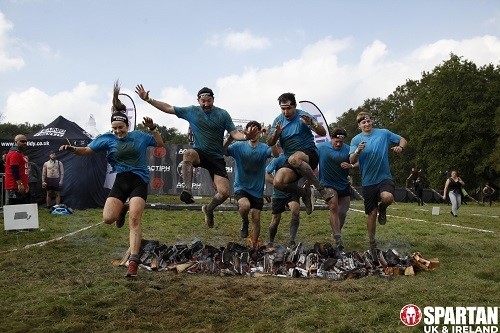 Photo: Irwin and Colton, The challenge
Photo: Irwin and Colton, The challenge
As in many metrics-driven environments, work can be fast-paced and there are pressures when working towards targets. Keeping morale up is vital, says company co-founder Michael Colton. “Building resilience is really important, we try to help the team cope with the natural ups and downs and when things don’t always go as planned.”
In the Michael’s view, it’s important not only to celebrate when things ‘go right’ but to recognise the effort people put in to provide a high-quality service to candidates and clients at all times.
Wellbeing initiatives
Unsurprisingly for a company where teamwork and goals are important, there is a big emphasis on sports, games and activities when it comes to wellbeing.
Each year the company takes on an annual team challenge, with staff nominating ideas. Recent ones have included Tough Mudder, Wolf Run and The Spartan, a half marathon event comprising of 30 obstacles in the East Sussex countryside. “Training together and working towards a goal helps create great camaraderie and encourages a supportive culture. Another positive is creating shared memories across the team!” enthuses Michael.
Located near a nature reserve and two rivers, the office is the ideal place for running and there is a weekly Tuesday lunch run club. “The summer runs are always more popular, but whether it’s one person or eight, everyone comes back feeling energised for the afternoon,” says Michael.
Chosen by staff and impact
How do they decide what kind of wellbeing initiative or activity to hold? Michael says the staff are ‘generally quite an active group of people’ but not all activities are sports-based. “We try to collect as many ideas from the team as possible. The team have been great in coming up with ideas, from the international themed bake offs, to helping select the annual charities that we will support.
“We try to be inclusive so that everyone has a voice and we can offer a range of different initiatives which will work for as wide a range of people as possible. New ideas for 2023 involve offering the team assistance with financial planning, mortgages and savings advice from independent experts, and healthy meals delivered to the office.”
How do they ensure the initiatives support business functioning and the aims of the company? “Having a regular calendar of events helps the team have goals and focus but also things to look forward to,” says Michael. “The team activities have created a really strong culture of supporting fellow colleagues and working as a team.”
2. COLLABORATIVE PROCUREMENT PARTNERSHIP
The Collaborative Procurement Partnership (CPP) is a service provider to the NHS Supply Chain. It is responsible for the procurement and contracts that allow the NHS to buy the products it needs.
The company won the British Safety Council’s Wellbeing Initiative Award in 2022 for its outstanding work on wellbeing during the pandemic in 2021.
The challenge
Helen Lisle, CPP managing director, says: “As a service provider to NHS Supply Chain, our teams were right at the heart of the response to Covid-19 and the urgent need to procure more personal protective equipment (PPE) for the NHS and other public services on the frontline.”
“We had to quickly move from an office-based company to home working at a time when our staff were working in a highly pressurised environment to procure PPE to meet the urgent demand.”
Wellbeing initiatives
CPP identified that priorities had to be around preventing burnout and isolation, both risks when workload was higher than normal and staff worked mostly at home.
One of the ways to achieve this was to support general emotional wellbeing, often by bringing a bit of fun back into the working day. There were a wide range of initiatives, from ‘You’re flippin’ amazing!’ a pancake making competition where employees were posted ingredients to make and share their creations, to a health and wellbeing week full of online webinars, including on managing stress and virtual yoga.
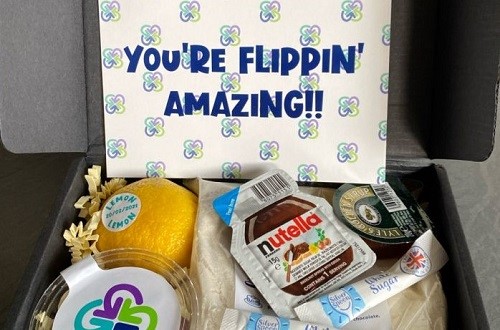 Pancake making kit box which CPP staff were sent as a thank you and for a Shrove Tuesday competition. Photograph: CPP
Pancake making kit box which CPP staff were sent as a thank you and for a Shrove Tuesday competition. Photograph: CPP
“We encouraged staff-led initiatives to achieve greater buy-in from employees,” says Helen. “For example, the staff entertainments team ran events during lunch breaks including online quizzes and bingo sessions, as well as competitions for everything from making the best pancake through to doing the best TikTok dance.”
The other challenges on staff wellbeing in 2021 were around musculoskeletal health. “Many of our people didn’t have a working environment in their homes which would support their wellbeing long term. The technology was there as we could all just take our laptops home and carry on but the level of workspace comfort in people’s homes did not always match the working environment we could provide in the offices,” explains Helen.
CPP focused on providing simple and engaging ways to teach people how to set up supportive and safe workspaces. This was done via a workplace inspection and reporting tool, guides for easy learning and newsletters with useful articles and videos.
When restrictions eased and people were talking about a hybrid approach, CPP launched Smart Working as part of a phased return to the office to be combined with home working. Staff were asked how they wanted to work and a forum representing diverse groups of CPP employees helped to develop the plans.
Impact
CPP uses its annual staff survey to assess the effectiveness of its wellbeing initiatives, which last year had an 85 per cent response rate. Interventions were also measured through statistical data and these showed improvements. Between 2020 and 2021 absences related to anxiety, stress, depression and other mental health problems, were reduced by 34 per cent and musculoskeletal problems fell by 13 per cent.
Helen says: “Investments that you make in supporting the health and wellbeing of your colleagues make sense from a business perspective as lower sickness rates mean better productivity and fewer lost working days.
“But for me the bigger benefit is that if you demonstrate and genuinely dedicate efforts to improve employee health and wellbeing you will achieve better engagement with those colleagues in what you and your company is doing.”
3. NOTTINGHAM UNIVERSITY HOSPITALS (NUHS) NHS TRUST
Nottingham City Hospital and Queens Medical Centre, part of the NUHS NHS Trust, are two busy hospitals. The challenges they face are supporting patients and staff through all of medical treatment’s ups and downs.
As part of its arts programme, NUHS wanted to investigate how art could help support dementia patients who face challenges including getting confused or lost, feeling agitated or anxious and feeling isolated.
Art for wellbeing
NUHS worked with Paintings in Hospitals, a charity which loans museum-quality art to hospitals. More than 2,000 artists are represented in its collection, including Bridget Riley, Antony Gormley, Maggi Hambling, Helen Chadwick and Anish Kapoor and over 3,700 art works.
 Grey Horses by Tom Gentleman (1948) courtesy of Paintings in Hospitals
Grey Horses by Tom Gentleman (1948) courtesy of Paintings in Hospitals
Both clinical and non-clinical care staff at NUH, including arts champions and occupational therapists, chose artworks from the collection to brighten up the corridors for dementia patients and carers.
Ten artworks were displayed in corridors near the wards for older patients, with the exhibitions launching in June 2022.
Impact
Not only did artworks help to promote reminiscence, stimulate memory and support group discussions for patients, but they also encouraged creative exploration. The hospital ran activities related to the works on display, such as painting a favourite holiday destination and creating flower decorations.
The art also enhanced wellbeing for nurses and staff. An NUH staff member said the artworks provide time to “take a breath when you walk by and have a look”: “I still look no matter how many times I go by. It is a quiet space.”
The artworks will be in place for the three-year loan period and there are more wellbeing activities planned.
There is growing evidence for how art can enhance the environment and wellbeing of patients, staff and visitors in hospitals. During 2015–17, the All-Party Parliamentary Group on Arts, Health and Wellbeing conducted an inquiry into this topic. Committee member Lord Darzi, professor of surgery at Imperial College London, said: “There is a compelling case for our healthcare systems to better utilise the creative arts in supporting health and wellbeing outcomes.”
4. FUJITSU
Fujitsu is the world’s 10th largest IT services provider by annual revenue and number one in Japan. Headquartered in Tokyo, the company has approximately 124,000 employees supporting customers in 100 countries.
With so many employees, the challenge is to offer enough variety in wellbeing support and initiatives to appeal to the broadest range of people represented among its workforce.
Wellbeing initiatives
Amanda Hammond, wellbeing programmes lead at Fujitsu tells us: “No two employees are the same, so this year we have implemented a range of new initiatives, including our Total Body Mind refresh sessions every Wednesday. Here, a yoga and meditation instructor helps employees with breathing exercises to help restore calm. About 30 people join a week and so far, we’ve had a positive response.”
“But we know a meditation session is not for everyone; so, we have initiatives such as Microsoft Viva Insights which automatically blocks focus time into people’s diaries and provides wellbeing tools such as a ‘virtual commute’ to allow for invaluable unwinding time. It also automatically creates a daily to-do list, helping people get in the right frame of mind.”
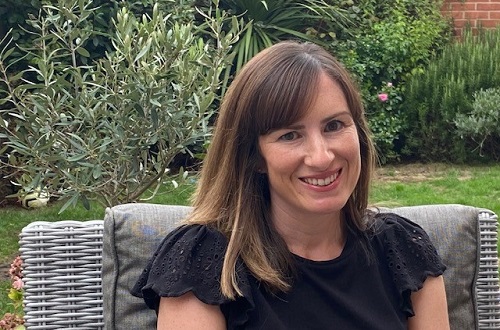
 With the growth in uptake of home and hybrid working, it has been important to tackle digital causes of stress, such as isolation and lack of routine and to use technology positively to support wellbeing.
With the growth in uptake of home and hybrid working, it has been important to tackle digital causes of stress, such as isolation and lack of routine and to use technology positively to support wellbeing.
“We’re able to automatically set meetings to shorter times: instead of a one-hour meeting, the system books in 50 minutes and ensures that the team have breaks between calls,” says Amanda.
We’ve also introduced a Work Your Way Hour whereby every employee each week blocks out one hour in their calendars for a non-work activity of their choice. This emphasises the importance of wellbeing being built into the working week.”
 Ultimately, says Amanda, wellbeing initiatives are great for the group but support for individuals needs to be tailored – there is no one size fits all solution.
Ultimately, says Amanda, wellbeing initiatives are great for the group but support for individuals needs to be tailored – there is no one size fits all solution.
“We’ve found that by having lots of small initiatives, we can make a bigger impact on how people feel. However, this must coincide with line managers having the appropriate training to have honest conversations to identify what individuals need for their own personal wellbeing. When people demand wellbeing from their employers, this one-to-one approach is crucial.”
5. SOCIAL WORK
Social workers are ‘pulled in multiple directions’, where a tipping point is reached and the values to which they are deeply committed are compromised, with wellbeing impacts, making the job ‘no longer tenable’.
Such were the depressing findings in this year’s Setting the Bar report which identified an urgent need for greater support for social workers and to increase the workforce. With unpaid, overtime working at all levels being the norm, more needs to be done.
A perennial issue is that social workers do not feel well understood outside the profession and the report recognises a need for better public representation of the job. Social workers also face high levels of stress and, though this is nothing new, a new project says there are opportunities for new ways to address the impact.
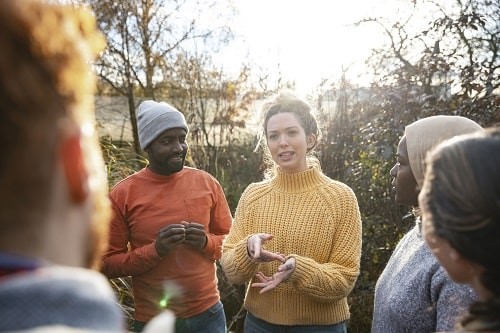 "Now more than ever we need to support our social work workforce so that they continue to have the strength to be there for those who need them." Photograph: iStock
"Now more than ever we need to support our social work workforce so that they continue to have the strength to be there for those who need them." Photograph: iStock
Wellbeing initiative
Poetry for Wellbeing, which launched this November, is a series of poetry workshops delivered by the Scottish Association of Social Work (SASW), the Scottish Poetry Library (SPL) and the Universities of Edinburgh and Stirling. It is aimed at supporting the 10,919 social workers in Scotland.
Sarah McMillan, social worker and professional officer at SASW, says: “We all know about the pressures social workers are under. High caseloads and scarce resources are just some of the sources of daily pressure.”
“Now more than ever we need to support our social work workforce so that they continue to have the strength to be there for those who need them. While SASW is focused on achieving improved working conditions for social workers, there is also a role for us in supporting social workers to develop strategies to process the emotional impact of the complex work they do.”
The project aims to harness creativity as a means of processing experiences and emotions. “Social workers do complex work that can often be emotionally draining,” adds SASW National Director, Alison Bavidge. “We know from Setting the Bar that the challenges of the post-pandemic world are placing even greater demands on social workers. The cost-of-living crisis may cause this to worsen as demand for public sector support increases.”
“It is therefore crucial for social workers to have strategies to process difficult experiences and emotions and enhance their self-care.”
The workshops will be used to form a toolkit of materials for social care practitioners to run their own poetry wellbeing groups and aid reflection, self-care and rejuvenation.
Impact
Workshops have only just rolled out. But there is a growing body of evidence demonstrating how poetry can be an effective tool in supporting positive mental wellbeing.
The project is supported by funding from the Scottish Government’s Workforce Wellbeing Fund for Adult Social Work and Social Care.
Sign up to British Safety Council's Keep Thriving campaign for more tips and ideas on creating your own wellbeing strategy and initiatives:
www.britsafe.org/campaigns-and-policy/keep-thriving-campaign
FEATURES

How to mitigate the hearing loss cost escalation tsunami
By Peter Wilson, Industrial Noise and Vibration Centre (INVC) on 06 February 2026
Employers need to adopt the latest and most effective noise risk evaluation and management measures, or face rapidly-rising compensation claims for noise-induced hearing loss at work.

Young drivers and work-related road risk: why employers must act now
By Simon Turner, Driving for Better Business on 06 February 2026
Young drivers have a higher risk of being involved in road collisions due to factors such as their inexperience, so when employing them to drive for work, it is vital they receive the right support to help them grow into safe professionals behind the wheel.
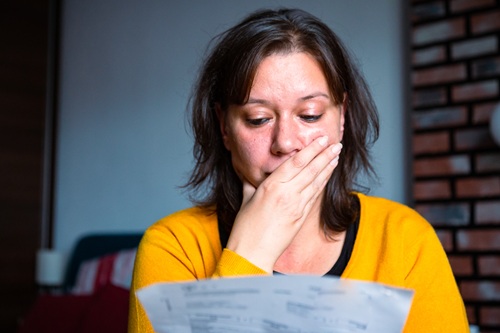
Financial stress: why and how it affects workplace safety
By Chloe Miller, freelance writer on 06 February 2026
Financial worries can lead to cognitive impairment that increases the risk of workplace accidents, so it’s essential employers provide financial education and confidential support for workers who may be struggling with problems like debt and unexpected living expenses.



